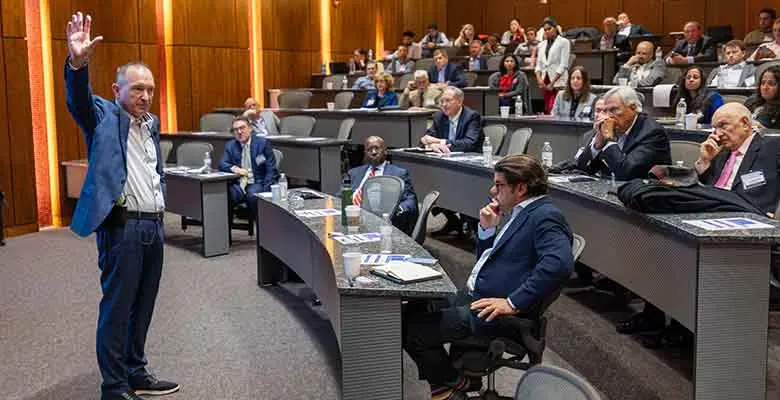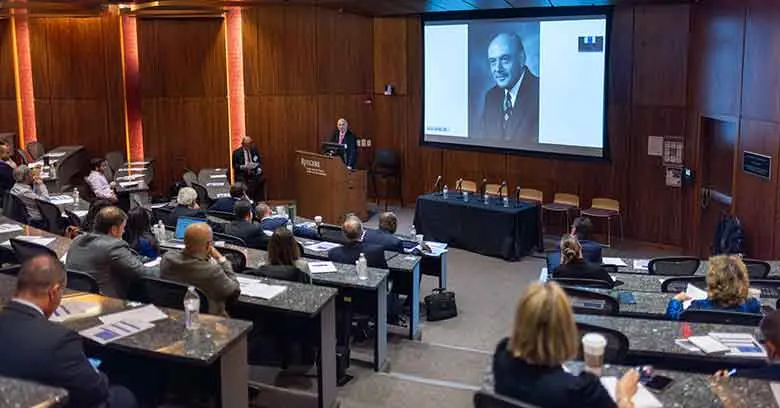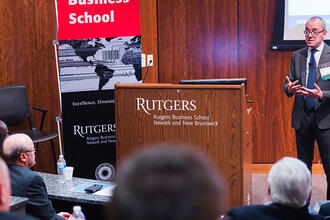
Panelists discussing the challenges pharmaceutical companies face with the implementation of the 2022 Inflation Reduction Act.
Lerner Center symposium examines implications of Inflation Reduction Act
A group of pharmaceutical industry experts criticized federal legislation that they believe will hurt new drug research during a symposium hosted by Rutgers Business School’s Blanche and Irwin Lerner Center for the Study of Pharmaceutical Management Issues.
The symposium, a signature event for the center, featured a keynote address by Paul Hastings, president and CEO of Nkarta Therapeutics, who spoke about his persistent lobbying efforts in Washington D.C. to communicate the industry’s perspective of the Inflation Reduction Act that Congress enacted in 2022.
“(The IRA) imposes limitations on the pharmaceutical companies,” Hastings said. “The lack of transparency around pricing needs to be fixed.”
Hastings said on Capitol Hill the law is referred to as the “Innovation Reduction Act” because “it gets in the way” of companies continuing to make money that is used to pay for research that produces new treatments.

But both Hastings and the industry experts who participated in a panel discussion said the process the government is using to adjust prices is not transparent, and they were critical of how much cost-savings would be passed onto patients. “Affordability,” Hastings said, “is the price paid out-of-pocket – the patient’s cost.” It isn’t the price insurers pay.
Professor Mahmud Hassan, the center’s director, had promised the audience would hear from “powerful, influential speakers.” A charismatic keynote by Hastings was followed by a thoughtful conversation among veterans of the industry about wide-ranging implications, and possible unintended consequences, of the new law.
Richard Bagger, a former executive at Celgene, moderated a panel discussion among three experts who also expressed skepticism over how well lawmakers understand the act’s implications on the ability of drug makers to price new medicines for the market so they’re able to reinvest their revenue and bring new discoveries to market.
The panel was composed of Neal Masia, co-founder and CEO of EntityRisk; John O’Brien, president and CEO of the National Pharmaceutical Council; and Amadou Diarra, who served as senior vice president of global policy, patient advocacy and government affairs at Bristol-Myers Squibb. They discussed the implications of the IRA on different types of treatments – from small molecules to orphan drugs and biosimilars, for instance – as well as how lawmakers are establishing the long-term value of medicines.
Like Hastings, the panelists expressed concern about the role of pharmacy benefit managers, politics and the ability of drug makers to leverage the societal value of prescription drugs in their arguments to Congress. “It’s a very messy time for the industry right now,” Masia said. “This is a major challenge.”
The healthcare symposium returned this spring for the first time since 2020 when the global COVID-19 pandemic forced Rutgers University to close down its campuses. The timing of its return offered Rutgers Business School an opportunity to pay tribute to Irwin Lerner, the pharmaceutical executive who funded the creation of the Lerner Center 20 years ago.

In her welcoming remarks, Rutgers Business School Dean Lei Lei described the center as “an excellent example of connecting industry with the classroom.”
The exchange of ideas between academia and industry was exactly what Lerner, who was also an alumnus of the Rutgers MBA Program, intended when he created the center in 2004. Ken Berkowitz, who worked closely with Lerner at Hoffman-La Roche for more than 20 years, spoke about his leadership as Hoffman LaRoche’s chief executive and his influence over the industry.
Lerner led the Swiss drug maker’s U.S. headquarters when it has a sprawling presence in New Jersey. He also pushed for the modernization of the Food and Drug Agency’s review and approval process for new medicines, Berkowitz said. “It was the coming age of new developments,” he said, “and (Lerner) faced opposition by both business and regulators.”
Hastings also remembered Lerner as an “amazing and impactful leader.”
Michael Lerner, who now serves as chair of the center’s board, said it was his father’s hope that by facilitating the exchange of ideas, the Lerner Center would help “to develop the next generation of leaders in the pharmaceutical industry.”
The symposium drew an audience of nearly 100 people, including Rutgers MBA and Executive MBA students, faculty, and professionals from Big Pharma and biopharma companies, which included Rutgers alumni.
Press: For all media inquiries see our Media Kit


